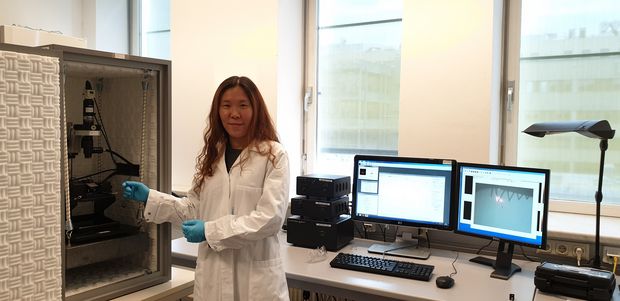A new method at the JKU can study molecular binding affinity 100 times faster than before.

Marry in haste, repent at leisure: How and when different molecules bind to other molecules plays a crucial role in the drug development. Drug effectiveness is based on molecular binding affinity. A new method at Johannes Kepler University Linz allows scientists to study the binding affinity 100 times faster than before.
Dr. Yoo Jin Oh (Department of Applied Experimental Biophysics, Dept. Head Prof. Peter Hinterdorfer) requires samples containing only 100-700 molecules for her method. Previous studies required samples containing between 10,000 and 10 million molecules. The drastically smaller amount for required samples greatly simplifies and accelerates the ‘quantification of binding affinity’. Dr. Oh remarked, “In other words, it is now easier and cheaper to study the likelihood of substances binding to each other and to what extent. Being able to assess this binding affinity reliably is the basis for a drug’s effectiveness and is enormously important for biotechnology and pharmacology.”
Studies in Nano-Size Areas
Scanning probe microscopic detection methods based on JKU technology made this breakthrough possible by creating the single-molecule detection method. This allowed the JKU researcher to make DNA samples on tiny silicon substrates (about 1 billionth of a meter in size) visible.
Dr. Oh has now presented her research in the renowned journal Nano Letters under the title “Ultrasensitive und markierungsfreie Sondierung der Bindungsaffinität mittels Erkennungsbildgebung”.
Univ. Prof. Dr. Peter Hinterdorfer, head of the Institute for Biophysics, described the project’s multidisciplinary nature, “The work is also interesting because it combines exciting research areas such as nano-biophysics, biotechnology, and molecular diagnostics and drives these areas forward.”
About Dr. Oh
Born in 1981 in South Korea, Dr. Oh completed her studies in physics at the Ewha Womans University in Seoul and came to the JKU in 2009. She has received numerous awards and accolades for her work, including three national awards, four international awards, and over 1 million euros in funding. She currently conducts research at the Institute for Biophysics.
Contact:
Univ. Prof. Dr. Peter Hinterdorfer
Institute for Biophysics
Ph.: 0732 2468 7631
E-mail: peter.hinterdorfer(at)jku.at








